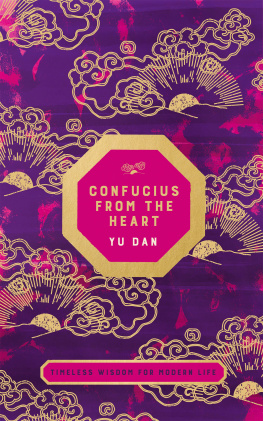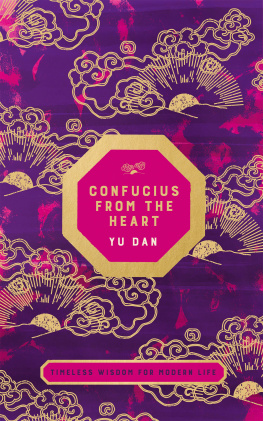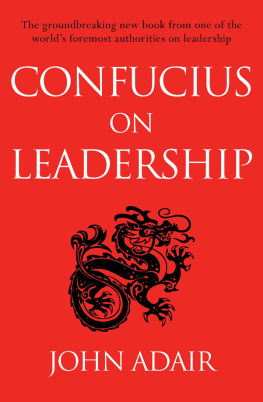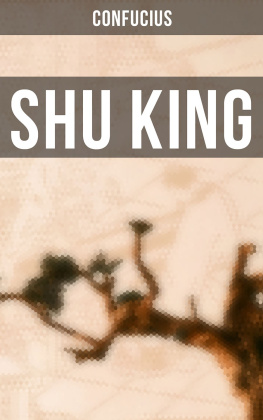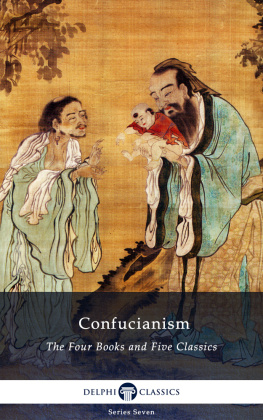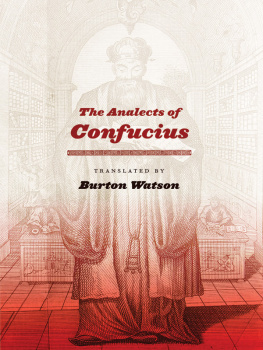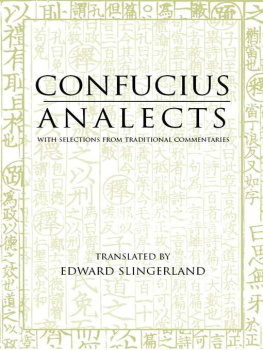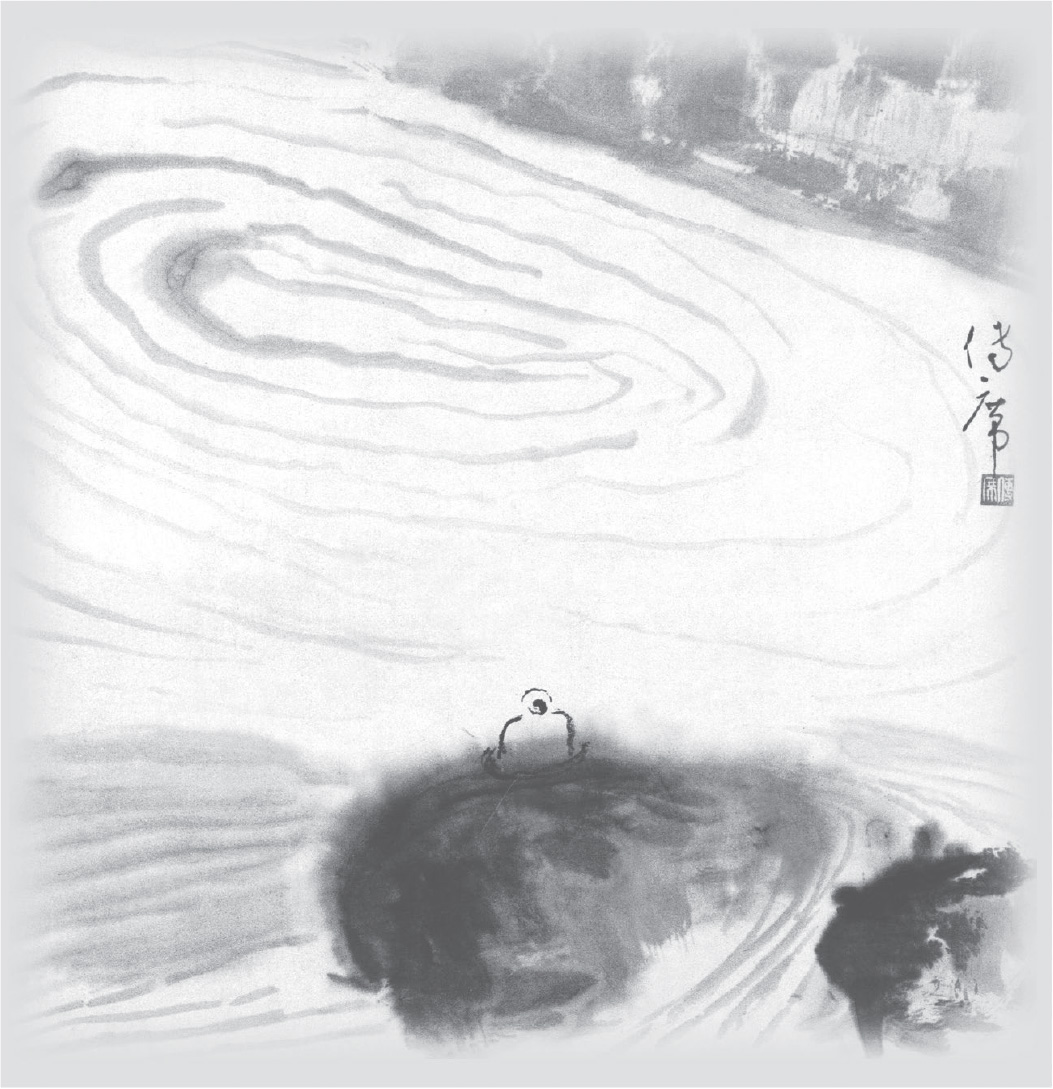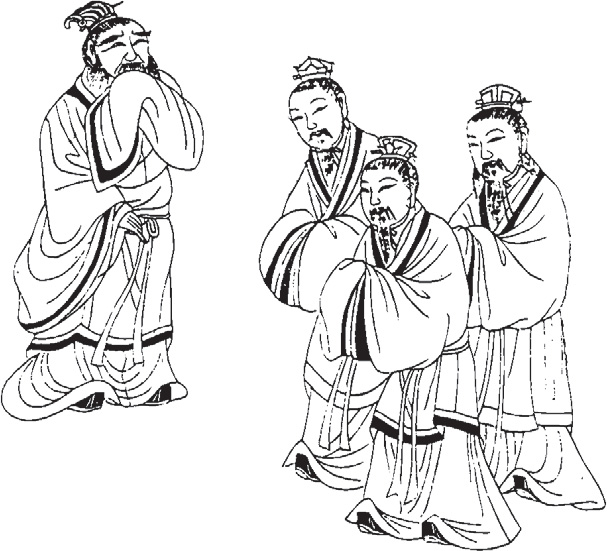Contents
Guide
Foreword Why Confucius?
Over two thousand five hundred years ago, the students of the thinker and philosopher Confucius wrote down every scrap and scattered fragment of his life and teachings that they could find. These records, based for the most part on classroom notes, were compiled and edited, and afterwards they became what we know as The Analects of Confucius. Analects simply means a collection of writings.
Just over two thousand years ago, the great Han Dynasty emperor Wu rejected a hundred other philosophical schools in favour of Confucius, effectively making China a Confucian state.
A thousand years ago the first prime minister of the Song Dynasty, Zhao Pu, boasted that he could rule the known world with just half a book of the Analects. From this we can see the tremendously important role that Confucius played in the political and social life of ancient times, and the high esteem in which his collected teachings were held by the ancients.
But what practical meaning do they have for our society and our lives today?
When I entrusted the manuscript of my book to the Zhonghua Book Company in China at the end of 2006, I was content but also a little troubled. I started my masters degree in pre-Qin Dynasty literature at the age of twenty-one, and I had grown up immersed in books from the Zhonghua Book Company, but I would never have dared to dream that one day this elite publishing house might bring out a book of mine, no more than I would have presumed to entertain the hope that I would ever dare to stand up and talk about The Analects of Confucius on television
I have always respected this book rather than fearing it, and my feelings towards it have always been plain, simple and warm.
Once, in a small town in north China, famous for its hot springs, I saw something called the Ask Sickness Spring. It is said that anybody who takes a comfortable soak in its water will at once understand the source of their illness: people with arthritis will get a tingling feeling in their joints, those with gastro-intestinal problems will experience a hot sensation in their gut, while people with skin complaints will feel a pleasant flush all over their skin, as if a layer of skin is being washed away, like the sloughed-off skin of a cicada.
For me, the wisdom of Confucius is just such a spring of warm, living water.
With my limited knowledge, even if I truly wanted to write an in-depth analysis of Confucius, I would never, ever dare to do such a thing. It would be like sending me off to make a chemical analysis of that hot spring, when I am totally unequipped to do so. The only possible role for me is that of someone who has been immersed in the spring myself, testing it with my own body and blood, like the thousands and thousands of people who over the last two hundred years and more have steeped themselves in this hot spring, and experienced its gifts.
The good will see goodness in it, and the wise see wisdom. Perhaps the value of this classical text is not in rituals and reverence that inspire awe and fear, but in its inclusiveness and fluidity, the wisdom in which so many people have immersed themselves down the ages, so that every life and every individual, though perceiving it differently, and following different paths, can arrive at last at the same final goal. In China we say The truth has never been far away from ordinary people and here that is certainly the case.
It seems to me that the sages never used obscure classical quotations to intimidate people, nor did they load their writing with fancy phrases and difficult words to shut them out. Confucius said: I am thinking of giving up speech. Zigong said hastily: If you did not speak, what would there be for us, your disciples, to transmit? Confucius said, calmly and matter-of-factly: What does Heaven ever say? Yet there are the four seasons going round and there are the hundred things coming into being. What does Heaven ever say?
The easy truths of this world can enter into peoples hearts because they have never been about indoctrination, but rather an inner call to wake up every heart and soul.
The reason why these simple truths have survived down the millennia is that they have helped generation after generation of Chinese to stay grounded, to understand the nation and the culture that formed them, and not to lose their heads, even when confronted by immense social change and almost overwhelming choice.
Those who benefit from the wisdom of Confucius may experience a moments heart-stopping enlightenment, in which understanding suddenly floods through them; equally, they may undertake a lifetime of endless study in order to attain understanding.
I really must thank the television programme Lecture Room for encouraging me to approach Confucius from this angle of xinde an understanding that comes from the heart as much as the head. A thousand hearts will get a thousand different things out of his work, ten thousand will get ten thousand different things from it, and mine is no more than the understanding of one heart among many. When we read it in the course of our lives today, and everything suddenly becomes clear to us, Confucius must surely be smiling silently on us from across the centuries.
The Song Dynasty prime minister Zhao Pus boast is a respectful acknowledgement of Confucius as the source of Chinese traditional culture and thought. I, however, would rather say: With half a book of the Analects I can enrich myself. Everybody should see it as a warm, gentle Ask Sickness Spring.
Therefore what we can learn from Confucius today is not the Confucian Learning set out by Emperor Wu; it is not the solemn, dignified, ritualized Confucian religion that stands alongside Daoism and Buddhism in China; nor is it the Confucianism of the scholars, full of deep argumentation and fettered by textual research.
What we can take away from the Analects of Confucius are the simple truths that every person knows in his or her heart, though they may not let them out through their mouths.
In my view, the wisdom of Confucius does not burn your hands, nor is it icy cold, its temperature is just slightly above body heat, for it is a constant that will remain the same throughout the ages.
Midnight, 16 November 2006
Part One
The Way of Heaven and Earth
You should not think that the wisdom of Confucius is lofty and out of reach, or something that people today can only look up to with reverence.
The truths of this world are for ever plain and simple, in the same way that the sun rises every day in the east, just as spring is the time for sowing and autumn is the time to harvest.
The truths that Confucius gives us are always the easiest of truths.
They tell us all how we can live the kind of happy life that our spirit needs.
The wisdom of Confucius can help us to obtain spiritual happiness in the modern world, to get used to the daily routine of our lives, and to find the personal bearings that tell us where we are.

